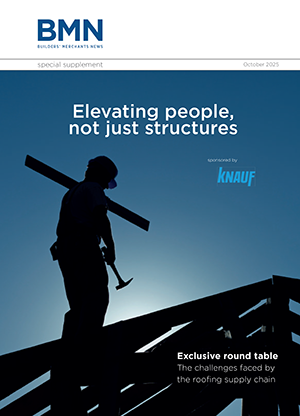Any temptation by the Government to introduce a ‘Conservatory Tax’ by the back door should be firmly resisted by ministers if they want a SME-led, private enterprise economic recovery, according to the Builders Merchants’ Federation (BMF).
The BMF's reaction was to a story in “The Guardian” (18 January) about a letter to the Chancellor of the Exchequer asking him to restore the so-called ‘Conservatory Tax’.
Several construction trade associations urged George Osborne MP to overturn the decision by Cabinet Minister Eric Pickles MP (13 December) to scrap proposed changes to Part L of the Building Regulations. During 2012, his Department of Communities & Local Government (DCLG) sought input on requiring voters to have energy-efficiency consequential improvements carried out when having conservatories, conversions or extensions done - or when replacing boilers or a number of windows.
Commenting on the letter, Brett Amphlett, BMF policy manager, said: “The BMF is against consequential improvements under Part L of the Building Regulations. We believe trying to force them on residents is heavy-handed and counter-productive. Anything that makes small works more expensive will affect merchants and their SME customers. At a time when builders, plumbers and allied trades are vital in creating much-needed local growth, consequential improvements are a bad idea.”
Mr Amphlett said the Federation had no quibble with other aspects of the letter. For example, asking the Government to stick to its declared commitment for all new homes and all new non-residential buildings to be zero carbon from 2016 and 2019 respectively. He agreed that better or smarter regulation - and keeping or modifying some of the rules on housing - would permit fairer competition amongst builders and property developers.
Mr Amphlett continued: “The Federation is not arguing for wholesale cancellation of the Building Regulations. Clear, unambiguous and sensible regulations, standards or codes against which an orderly market can operate and grow for everyone - builder, merchant and manufacturer - are a good thing.”
The signatories want the Chancellor of the Exchequer to reconsider elements of the consequential improvements idea which, they claim, would be a powerful driver of the Green Deal that officially starts next week (28 January). Their belief is that if people making large-scale home improvements were forced, by law, to take up the Green Deal - and make their houses more efficient at the same time as adding to them - that would be a powerful boost.
Mr Amphlett added: “I am puzzled about this. If the Government entertains the idea of compulsion, it signals its ambition for the Green Deal is downgraded even before it begins. If compulsion is necessary, why wasn’t it incorporated at the beginning into the Energy Bill as it went through Parliament?
“Consequential improvements pose a genuine threat to BMF members. Homeowners may find themselves pushed into using the Green Deal to pay for the extra work they will be forced to do. This could compel them to use specialist suppliers or third-party contractors, in addition to - or instead of - their local builder. Alternatively, voters may simply hand the entire project over to big, national businesses - and cut out local merchants and SME firms completely.”






